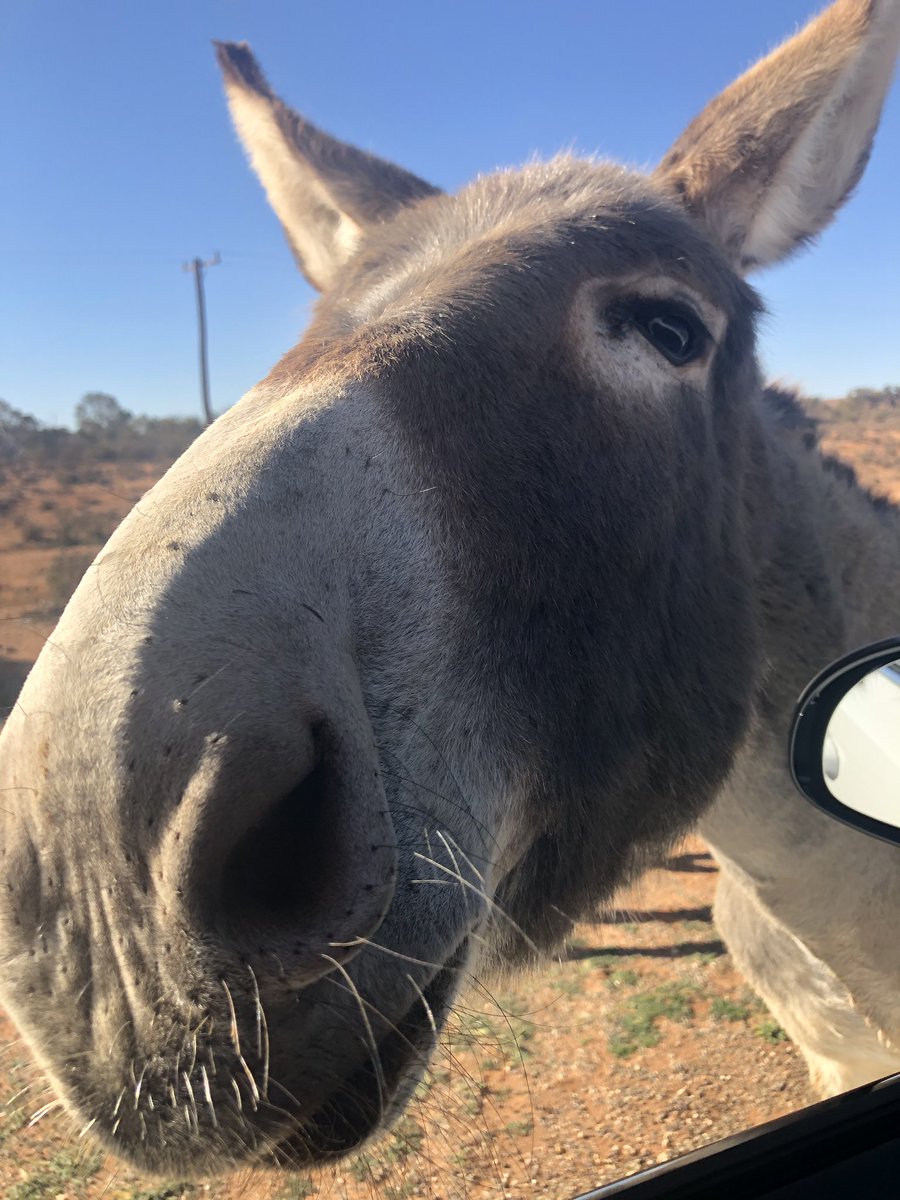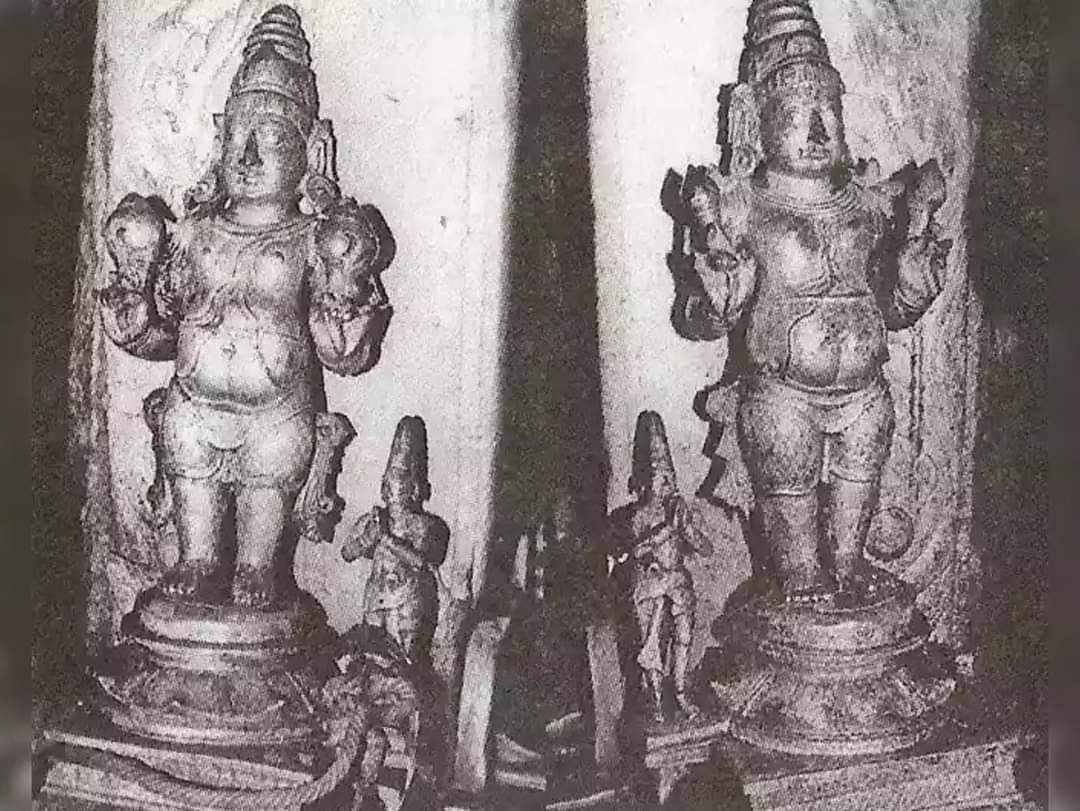So here is a secret: Not everything I write goes anywhere. I have at least 4 books completely written and edited that never went on submission. I have books that stalled out at 20k. I have docs on my computer with opening paragraphs I don't remember writing. But! 1/
* it's more idea than plot
* your characters or world aren't fully built
* you're writing the wrong form for that particular story
Is it a journey or a stabbing? 11/
* identify beginning, inciting incident, conflict, climax, end
* craft a protagonist uniquely challenged by the world & conflict
* write straight through, front to back, no editing/self-judging
* if you stall, insert [tk] &write the next scene you know 18/
* identify the gut punch/twist
* craft a protagonist who will succumb to it
* create a short, action-filled plot (not infodump/rambling) that will lead to the twist
* make sure it's self-contained and complete
* polish to perfection
* NO RAMBLING 19/
NO.
Action and dialogue. Kenneth saves a turtle in the road, and as he returns it to the pond, he meets THE TURTLE KING. 20/
More from Writing
In 2013, I woke up and said, "I want to write a book about Pokémon."
In 2017, I finally wrote it.
In 2019, thanks to the fine folks at @DelReyBooks, you'll all get to read it.
I'm pleased to announce my epic fantasy debut. Formerly: "Fullmetal Pokémist." Now:
STEEL CROW SAGA.

Seriously, everyone, I can't tell you how thrilled I am to share this one with you. The world is far-flung and weird, and the characters live lives so far removed from mine, but STEEL CROW SAGA is honestly the most personal and autobiographical thing I've ever written
Yeah, I guess I should address that early. STEEL CROW SAGA is not a trilogy. This is a standalone book. I left doors open for someday, but my plan right now is for each of these three books to be its own
Last thing I'll say here: I couldn't have asked for a better team than @DelReyBooks to work with--particularly @tnarwani, who just Gets this book. In our call, she casually cited a semi-obscure Korean movie from ten years ago, unaware it'd been a key influence. That's when I knew
Anyway. Plenty more to tease in the coming year. Thanks again to my friends who got me through it, and especially to @dongwon who saw this weird Toonami regurgitation and immediately believed in it. Today is my triumph, but it's also theirs.
In 2017, I finally wrote it.
In 2019, thanks to the fine folks at @DelReyBooks, you'll all get to read it.
I'm pleased to announce my epic fantasy debut. Formerly: "Fullmetal Pokémist." Now:
STEEL CROW SAGA.

Seriously, everyone, I can't tell you how thrilled I am to share this one with you. The world is far-flung and weird, and the characters live lives so far removed from mine, but STEEL CROW SAGA is honestly the most personal and autobiographical thing I've ever written
Yeah, I guess I should address that early. STEEL CROW SAGA is not a trilogy. This is a standalone book. I left doors open for someday, but my plan right now is for each of these three books to be its own
holy crappppppp i see A THREE BOOK DEAL hidden in there too!!!!!!!!
— do i dare to eat a \U0001f351 (@NicasioSilang) October 31, 2018
Last thing I'll say here: I couldn't have asked for a better team than @DelReyBooks to work with--particularly @tnarwani, who just Gets this book. In our call, she casually cited a semi-obscure Korean movie from ten years ago, unaware it'd been a key influence. That's when I knew
Anyway. Plenty more to tease in the coming year. Thanks again to my friends who got me through it, and especially to @dongwon who saw this weird Toonami regurgitation and immediately believed in it. Today is my triumph, but it's also theirs.
You May Also Like
This is a pretty valiant attempt to defend the "Feminist Glaciology" article, which says conventional wisdom is wrong, and this is a solid piece of scholarship. I'll beg to differ, because I think Jeffery, here, is confusing scholarship with "saying things that seem right".
The article is, at heart, deeply weird, even essentialist. Here, for example, is the claim that proposing climate engineering is a "man" thing. Also a "man" thing: attempting to get distance from a topic, approaching it in a disinterested fashion.

Also a "man" thing—physical courage. (I guess, not quite: physical courage "co-constitutes" masculinist glaciology along with nationalism and colonialism.)

There's criticism of a New York Times article that talks about glaciology adventures, which makes a similar point.

At the heart of this chunk is the claim that glaciology excludes women because of a narrative of scientific objectivity and physical adventure. This is a strong claim! It's not enough to say, hey, sure, sounds good. Is it true?
Imagine for a moment the most obscurantist, jargon-filled, po-mo article the politically correct academy might produce. Pure SJW nonsense. Got it? Chances are you're imagining something like the infamous "Feminist Glaciology" article from a few years back.https://t.co/NRaWNREBvR pic.twitter.com/qtSFBYY80S
— Jeffrey Sachs (@JeffreyASachs) October 13, 2018
The article is, at heart, deeply weird, even essentialist. Here, for example, is the claim that proposing climate engineering is a "man" thing. Also a "man" thing: attempting to get distance from a topic, approaching it in a disinterested fashion.

Also a "man" thing—physical courage. (I guess, not quite: physical courage "co-constitutes" masculinist glaciology along with nationalism and colonialism.)

There's criticism of a New York Times article that talks about glaciology adventures, which makes a similar point.

At the heart of this chunk is the claim that glaciology excludes women because of a narrative of scientific objectivity and physical adventure. This is a strong claim! It's not enough to say, hey, sure, sounds good. Is it true?
Joshua Hawley, Missouri's Junior Senator, is an autocrat in waiting.
His arrogance and ambition prohibit any allegiance to morality or character.
Thus far, his plan to seize the presidency has fallen into place.
An explanation in photographs.
🧵
Joshua grew up in the next town over from mine, in Lexington, Missouri. A a teenager he wrote a column for the local paper, where he perfected his political condescension.
2/
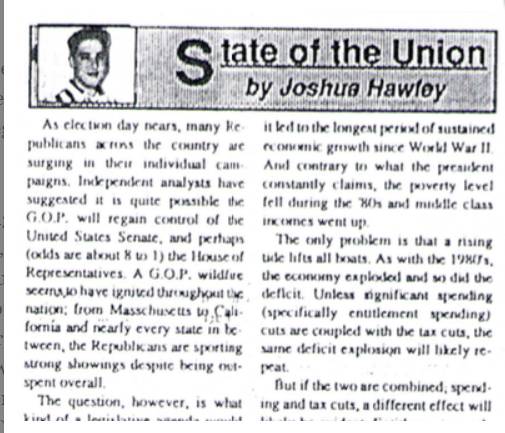
By the time he reached high-school, however, he attended an elite private high-school 60 miles away in Kansas City.
This is a piece of his history he works to erase as he builds up his counterfeit image as a rural farm boy from a small town who grew up farming.
3/

After graduating from Rockhurst High School, he attended Stanford University where he wrote for the Stanford Review--a libertarian publication founded by Peter Thiel..
4/
(Full Link: https://t.co/zixs1HazLk)
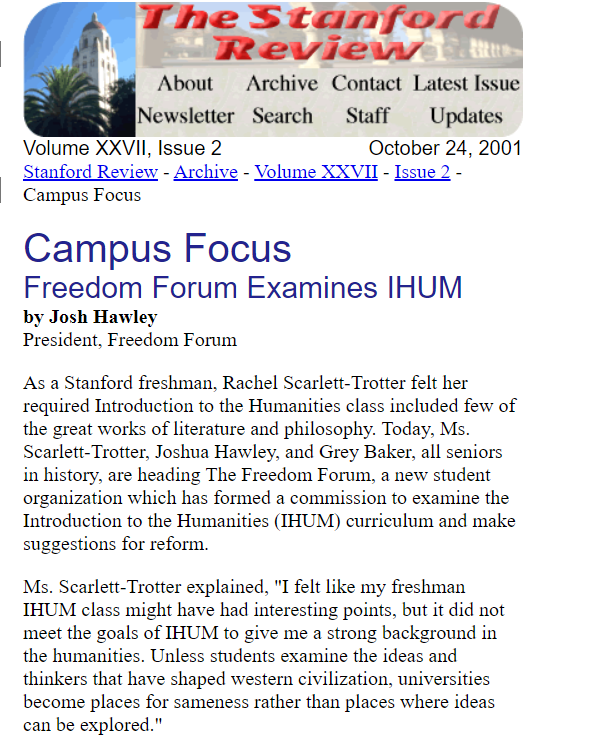
Hawley's writing during his early 20s reveals that he wished for the curriculum at Stanford and other "liberal institutions" to change and to incorporate more conservative moral values.
This led him to create the "Freedom Forum."
5/
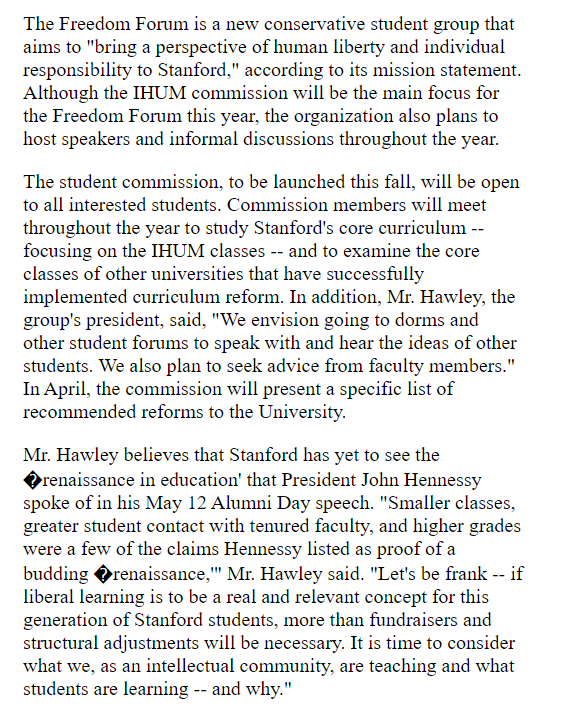
His arrogance and ambition prohibit any allegiance to morality or character.
Thus far, his plan to seize the presidency has fallen into place.
An explanation in photographs.
🧵
Joshua grew up in the next town over from mine, in Lexington, Missouri. A a teenager he wrote a column for the local paper, where he perfected his political condescension.
2/

By the time he reached high-school, however, he attended an elite private high-school 60 miles away in Kansas City.
This is a piece of his history he works to erase as he builds up his counterfeit image as a rural farm boy from a small town who grew up farming.
3/

After graduating from Rockhurst High School, he attended Stanford University where he wrote for the Stanford Review--a libertarian publication founded by Peter Thiel..
4/
(Full Link: https://t.co/zixs1HazLk)

Hawley's writing during his early 20s reveals that he wished for the curriculum at Stanford and other "liberal institutions" to change and to incorporate more conservative moral values.
This led him to create the "Freedom Forum."
5/











